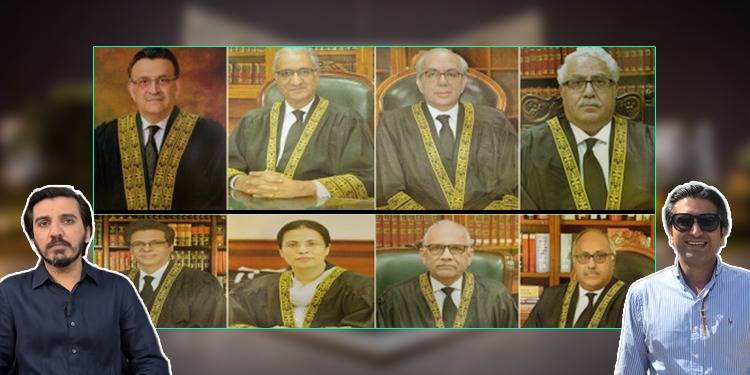
Some of the judges who form the bench hearing the bill related to the powers of the Chief Justice, are not at all confident about the case, suggests a statement by journalist Hassan Ayub.
The larger bench of the apex court is hearing multiple petitions against the Supreme Court (Practice and Procedure) Bill 2023.
Led by CJ Bandial, the bench comprises Justices Ijaz-ul-Ahsan, Munib Akhtar, Mazahar Naqvi, Muhammad Ali Mazhar, Ayesha Malik, Syed Hasan Azhar Rizvi, Shahid Waheed.
While speaking to Asad Ali Toor on Tuesday, Ayub elaborated on the SC hearing today, saying the judges frequently looked towards the top judge, which suggested they didn't have a 'confident' body language.
"The judges, especially four of them who were inducted later on, have their entire career ahead of them," he said during the podcast.
The journalist told Toor that the judges know that the case being heard will have a strong impact on their professional profile.
On April 13, the court suspended the bill passed by the Parliament till a final verdict is issued in the case.
The legislation
The bill, a copy of which is available with The Friday Times, suggests that “every cause, appeal or matter before the Supreme Court shall be heard and disposed of by a bench constituted by the Committee comprising the Chief Justice of Pakistan and two senior-most judges, in order of seniority.”
According to the draft legislation, any matter invoking the exercise of original jurisdiction under Article 184 (3) shall be first placed before the committee of three senior-most judges.
“If the Committee is of the view that a question of public importance with reference to enforcement of any of the fundamental rights conferred by Chapter I of Part II of the Constitution is involved, it shall constitute a bench comprising not less than three judges of the Supreme Court of Pakistan which may also include the members of the Committee, for adjudication of the matter,” it says.
The legislation also calls for appeals within 30 days of a verdict, issued on a suo motu case, and suggests that a bench be formed to hear such an appeal within 14 days.
The larger bench of the apex court is hearing multiple petitions against the Supreme Court (Practice and Procedure) Bill 2023.
Led by CJ Bandial, the bench comprises Justices Ijaz-ul-Ahsan, Munib Akhtar, Mazahar Naqvi, Muhammad Ali Mazhar, Ayesha Malik, Syed Hasan Azhar Rizvi, Shahid Waheed.
While speaking to Asad Ali Toor on Tuesday, Ayub elaborated on the SC hearing today, saying the judges frequently looked towards the top judge, which suggested they didn't have a 'confident' body language.
"The judges, especially four of them who were inducted later on, have their entire career ahead of them," he said during the podcast.
The journalist told Toor that the judges know that the case being heard will have a strong impact on their professional profile.
On April 13, the court suspended the bill passed by the Parliament till a final verdict is issued in the case.
The legislation
The bill, a copy of which is available with The Friday Times, suggests that “every cause, appeal or matter before the Supreme Court shall be heard and disposed of by a bench constituted by the Committee comprising the Chief Justice of Pakistan and two senior-most judges, in order of seniority.”
According to the draft legislation, any matter invoking the exercise of original jurisdiction under Article 184 (3) shall be first placed before the committee of three senior-most judges.
“If the Committee is of the view that a question of public importance with reference to enforcement of any of the fundamental rights conferred by Chapter I of Part II of the Constitution is involved, it shall constitute a bench comprising not less than three judges of the Supreme Court of Pakistan which may also include the members of the Committee, for adjudication of the matter,” it says.
The legislation also calls for appeals within 30 days of a verdict, issued on a suo motu case, and suggests that a bench be formed to hear such an appeal within 14 days.

